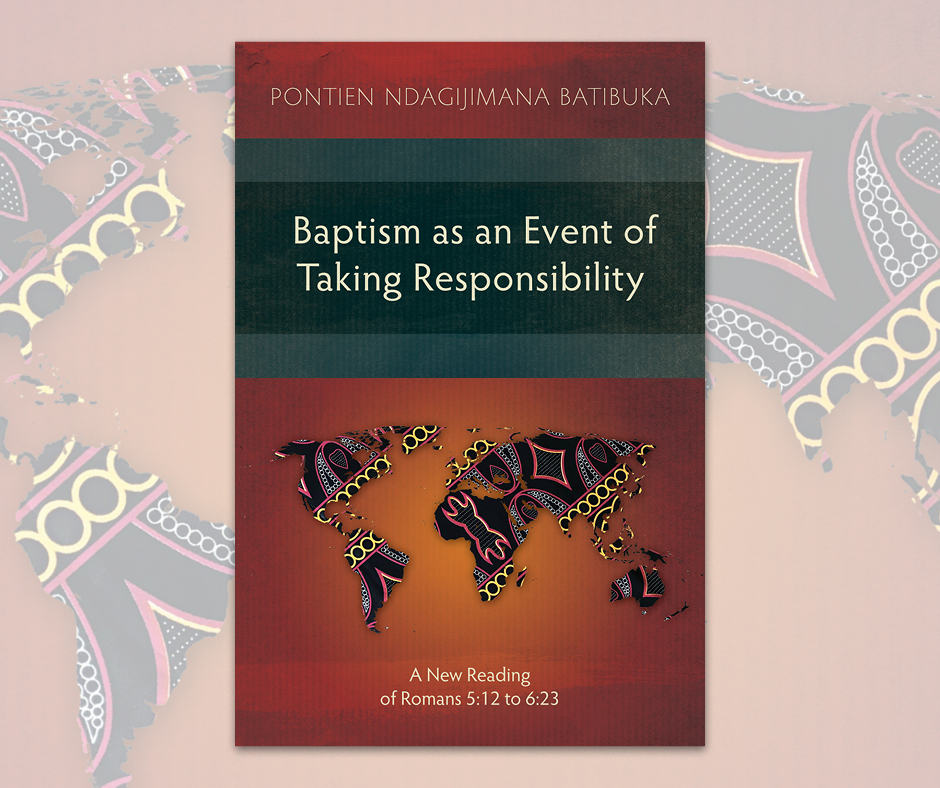A new book on baptism

Pontien Ndagijimana Batibuka, Baptism as an Event of Taking Responsibility: A New Reading of Romans 5:12 to 6:23, Langham Monographs, Carlisle: Langham Publishing, 2022. ISBN 9781839732348. £24.99.
Dr Pontien Batibuka has just published a revised version of his fine doctoral study of Romans 5:12–6:23, focusing on the meaning of baptism in that section of the letter. It’s well worth reading. He is a professor of New Testament studies and the Library Director at Shalom University of Bunia, Democratic Republic of Congo. He co-founded the NGO, PROREV (The Program of Empowering People Made Vulnerable by War) in 2019 for which he also serves as coordinator. His doctoral work was at London School of Theology with Steve Motyer as supervisor.
Here’s the commendation of it which I wrote:
Paul’s understanding of baptism is much debated, including whether baptism is divine or human action. Dr Batibuka offers a fresh approach to the question through a fourfold model of initiation drawn from the ancient world: an encounter with the divine, a break with the old way of life and attachment to the new, a public ceremony of transfer, and a commitment to a new way of life. The application of this model to Paul’s own conversion and to Romans 5–6 is thoughtful and engaging, drawing on a wide range of scholarship. It is particularly good to see Francophone scholarship well represented. Dr Batikbuka argues cogently that both divine initiative and responsive human dimensions of baptism are indispensable. To be baptized entails: a life-changing encounter with God-in-Christ; a change of allegiance to Christ; a public, ceremonial expression of that change in water; and a commitment to a new life with Christ as Lord. This thoughtful study deserves a wide readership.
It’s now available—here’s the table of contents:
- Abstract
- Abbreviations
- Foreword
- Chapter One Baptism in Romans 6 and the Idea of Taking Action
- The Research Question
- On Methodology
- Action is Not Always Physical: “Speech-Act Theory”
- Socio-Religious Approach to Romans 5:12–6:23
- Structure
- Two Presuppositions on Romans 5:12–6:23
- Romans 5:12–6:23: A Pericope on Transition and Action
- Baptism in Romans 6: Initiation as the Meaning
- Literature Survey: Action in Baptism, an Overlooked Aspect
- The Baptismal Candidate Considered as Passive
- Hints at Baptism as a Time of Action
- Conclusion
- Chapter Two The Four Stages of Entry into the New Life in Paul’s Time
- Introduction
- Ethnic Origin of Believers in Rome
- Relevant Religious Settings and Structure of Chapter Two
- The Four Stages and the Mysteries
- The Four Stages and State Religions
- Initiation to Adulthood
- Entry into Marriage
- The Four Stages in Jewish Context
- Proselytes’ Entry in Second Temple and Rabbinic Judaism
- Entry into the Qumran Community
- Summary
- Introduction
- Chapter Three Paul’s Conversion and the Four Stages of Entry
- Introduction
- Methodological Issues in Connection with Paul’s Conversion
- God’s Light and Glory Given to Paul (Stage One)
- Blind But Fasting and Praying (Stage Two)
- Sealing Attachment to the New Way: Baptism (Stage Three)
- The After-Entry Life Anticipated in the Entry Process (Stage Four)
- Summary
- Chapter Four The Four Stages and Action in Romans 5:12–6:23
- Introduction
- Divine Action at the First Stage: ἡ χάρις τοῦ θεοῦ καὶ ἡ δωρεὰ ἐν χάριτι . . . Ἰησοῦ Χριστοῦ εἰς τοὺς πολλοὺς ἐπερίσσευσεν (5:15)
- Second Stage Action: Death to the Old Way of Life (ἀπεθάνομεν τῇ ἁμαρτίᾳ, 6:1–2)
- Stating the Issue
- Death to Sin and the Initiatory Act of Breaking with the Old Way
- Third Stage Action: The Ritual of Baptism, Sealing the Rejection of the Old and the Bond with the New (6:3–4)
- Fourth Stage: The After-Entry Life Embraced in the Transition Process
- βασιλεύσουσιν (5:17) and Initiatory Future in Romans 5:12–6:23
- Διὰ δικαιοσύνης (5:21): Forensic, or the Initiate’s Righteous Life?
- Walking in the New Existence (ἐν καινότητι ζωῆς περιπατήσωμεν, 6:4–5)
- Serving the New Existence: The Slave Motif (6:6, 13–22)
- Summary
- Chapter Five Conclusion
- Summary of Findings
- The Rite that Seals Entry, a Time for Action: Chapters Two and Three
- Baptism in Romans 6: A Time for Action
- Suggestions for Further Research
- Achievement
- Summary of Findings

